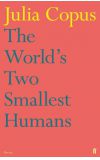
14 Aug 2012 00:32:33
Reading Julia Copus's remarkable collection – her third – makes one think about the risks involved in writing personal poetry. "Write about what you know" is not fail-safe advice because intimate poetry, unless of the highest quality, often comes across as paradoxically anonymous. Or worse, as many of the collections that come my way reveal, it can be as unsavoury and depressing as rummaging through dresses in a secondhand clothes shop. The wonder of Copus's poems is that although they could hardly be more personal – childhood; the end of an affair; a sequence on IVF treatment – there is no self-indulgence and no sense, for the reader, of being an intruder. In "Ghost" she avoids the first person and keeps a tight rein on emotion. The "weeping fig" and pregnancy kit "in pieces" may set the emotional tone but Copus permits herself no release beyond the "small, controlled explosion" (which could be a description of the poem itself). Instead, the moment of seeing the weak blue stripe, the hint of a pregnancy refusing to confirm itself, is recorded. And she finds an ending at once lyrical, with its escape into marine metaphor, and anticlimactic, as the moment demands.
Sometimes there is a sense in poetry that the emotion is in charge of the poet, but Copus has the upper hand throughout. There is something about the control, the high resolution, that gives this collection its special, contradictory emotional mixture: it is elegiac and buoyant. It's as if she were conscious, right from the start, that whatever life might throw at her, there is nothing poetry cannot catch. Not that this serves as banal therapy. Far from it. There is the awareness that while capturing a loss in words may amount to a small artistic triumph – and be balm – it cannot erase it.
Reading Copus, one thinks of Robert Frost's "The Road Not Taken" and his famous lines: "Two roads diverged in a yellow wood/ And sorry I could not travel both/ And be one traveller." Copus is interested in being that traveller. Poetry, she proposes, can imaginatively have it both ways. "This is the Poem in which I have not left you" is an interesting experiment in taking it all back, reconfiguring the past. At the same time it's a subtle reversal that reminds one of the desertion it seeks to avoid. There is something give-way about the rickety cottage to which she and her lover return. It has "leaky" windows and a "broken" gate and, one feels, might not last the poem. Copus has time at her mercy. In "Miss Jenkins" and "Raymond, at 60" she ingeniously shows how narrative can be reversible – time a concertina. She is always interested in exploring "what ifs". There is a wonderful, outlandish poem "Heronkind" in which she speculates about a heron in a fish-free world.

